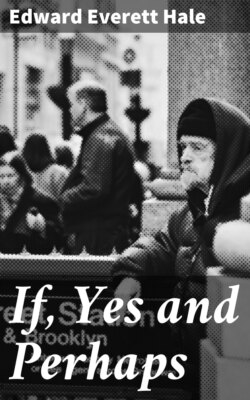Читать книгу If, Yes and Perhaps - Edward Everett Hale - Страница 6
На сайте Литреса книга снята с продажи.
THE PORK-BARREL.
ОглавлениеTable of Contents
"Felix," said my wife to me, as I came home to-night, "you will have to go to the pork-barrel."
"Are you quite sure," said I—"quite sure? 'Woe to him,' says the oracle, 'who goes to the pork-barrel before the moment of his need.'"
"And woe to him, say I," replied my brave wife—"woe and disaster to him; but the moment of our need has come. The figures are here, and you shall see. I have it all in black and in white."
And so it proved, indeed, that when Miss Sampson, the nurse, was paid for her month's service, and when the boys had their winter boots, and when my life-insurance assessment was provided for, and the new payment for the insurance on the house—when the taxes were settled with the collector (and my wife had to lay aside double for the war)—when the pew-rent was paid for the year, and the water-rate—we must have to start with, on the 1st of January, one hundred dollars. This, as we live, would pay, in cash, the butcher, and the grocer, and the baker, and all the dealers in things that perish, and would buy the omnibus tickets, and recompense Bridget till the 1st of April. And at my house, if we can see forward three months we are satisfied. But, at my house, we are never satisfied if there is a credit at any store for us. We are sworn to pay as we go. We owe no man anything.
So it was that my wife said: "Felix, you will have to go to the pork-barrel."
This is the story of the pork-barrel.
It happened once, in a little parish in the Green Mountains, that the deacon reported to Parson Plunkett, that, as he rode to meeting by Chung-a-baug Pond, he saw Michael Stowers fishing for pickerel through a hole in the ice on the Sabbath day. The parson made note of the complaint, and that afternoon drove over to the pond in his "one-horse shay." He made his visit, not unacceptable, on the poor Stowers household, and then crossed lots to the place where he saw poor Michael hoeing. He told Michael that he was charged with Sabbath breaking, and bade him plead to the charge. And poor Mike, like a man, plead guilty; but, in extenuation, he said that there was nothing to eat in the house, and rather than see wife and children faint, he had cut a hole in the ice, had put in his hook again and again, and yet again, and coming home had delighted the waiting family with an unexpected breakfast. The good parson made no rebuke, nodded pensive, and drove straightway to the deacon's door.
"Deacon," said he, "what meat did you eat for breakfast yesterday?"
The deacon's family had eaten salt pork, fried.
"And where did you get the pork, Deacon?"
The Deacon stared, but said he had taken it from his pork-barrel.
"Yes, Deacon," said the old man; "I supposed so. I have been to see Brother Stowers, to talk to him about his Sabbath-breaking; and, Deacon, I find the pond is his pork-barrel."
The story is a favorite with me and with Fausta. But "woe," says the oracle, "to him who goes to the pork-barrel before the moment of his need." And to that "woe" both Fausta and I say "amen." For we know that there is no fish in our pond for spendthrifts or for lazy-bones; none for people who wear gold chains or Attleborough jewelry; none for people who are ashamed of cheap carpets or wooden mantelpieces. Not for those who run in debt will the fish bite; nor for those who pretend to be richer or better or wiser than they are. No! But we have found, in our lives, that in a great democracy there reigns a great and gracious sovereign. We have found that this sovereign, in a reckless and unconscious way, is, all the time, making the most profuse provision for all the citizens. We have found that those who are not too grand to trust him fare as well as they deserve. We have found, on the other hand, that those who lick his feet or flatter his follies fare worst of living men. We find that those who work honestly, and only seek a man's fair average of life, or a woman's, get that average, though sometimes by the most singular experiences in the long run. And thus we find that, when an extraordinary contingency arises in life, as just now in ours, we have only to go to our pork-barrel, and the fish rises to our hook or spear.
The sovereign brings this about in all sorts of ways, but he does not fail, if, without flattering him, you trust him. Of this sovereign the name is—"the Public." Fausta and I are apt to call ourselves his children, and so I name this story of our lives,
"The Children of the Public."
